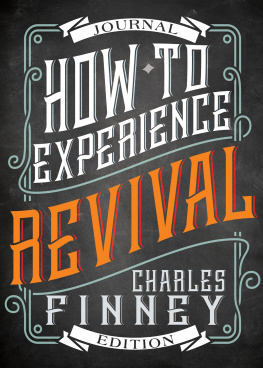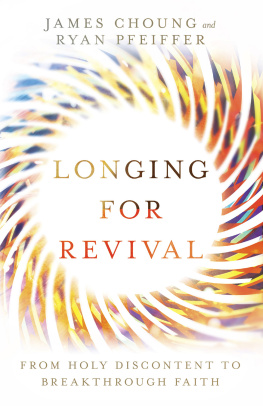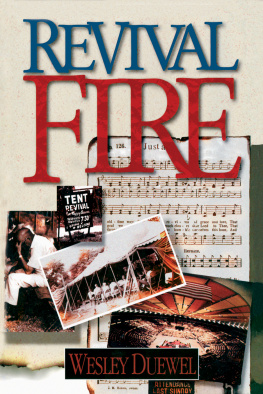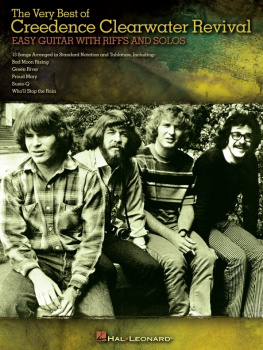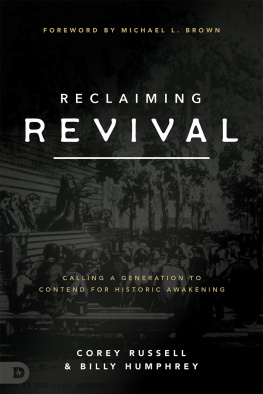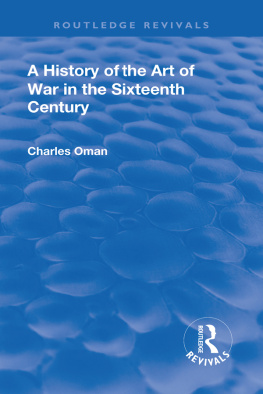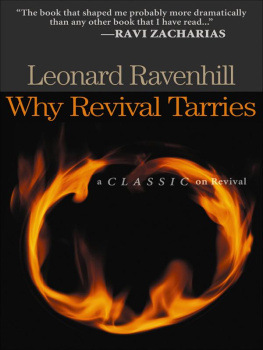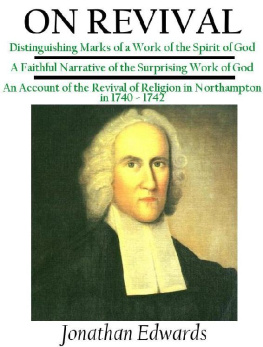

This new edition from Whitaker House has been updated for the modern reader. Words, expressions, and sentence structure have been revised for clarity and readability. Although the more modern Bible translations quoted in this edition were not available to the author, the Bible versions used were carefully selected in order to make the language of the entire text readily understandable while maintaining the authors original premises and message.
Unless otherwise indicated, Scripture quotations marked ( nkjv ) are taken from the New King James Version , 1979, 1980, 1982 by Thomas Nelson, Inc. Used by permission. All rights reserved. Scripture quotations marked ( kjv ) are taken from the King James Version of the Bible.
How to Experience Revival
Journal Edition
This work is updated from Finney on Revival (London: Marshall Morgan and Scott, 1939), edited by E. E. Shelhamer, which was an abridgement of Lectures on Revival by Charles Finney (Fleming H. Revell, 1835). Previously published by Whitaker House as How to Experience Revival (1984) and Experiencing Revival (2004).
ISBN: 978-1-62911-785-0 eBook ISBN: 978-1-62911-103-2
Copyright 1984, 2017 by Whitaker House
Whitaker House
1030 Hunt Valley Circle
New Kensington, PA 15068
www.whitakerhouse.com
The Library of Congress has cataloged the original trade paperback edition as follows:
Finney, Charles Grandison, 17921875.
Experiencing revival / by Charles Finney.
p. cm.
ISBN 0-88368-632-5
1. Revivals. I. Title.
BV3790 .F48 2000
269'.24dc21
00-010600
No part of this book may be reproduced or transmitted in any form or by any means, electronic or mechanical, including photocopying, recording, or by any information storage and retrieval system, without permission in writing from the publisher.
This book has been digitally produced in a standard specification in order to ensure its availability.
Note from the Publisher
T his new journal edition of Charles Finneys classic How to Experience Revival is specially designed to take you from words on a page to personal application and spiritual fruitfulness. In our age of distractions and hurry, many believers are reclaiming practices of meditation, of reflection, and of thoughtful prayer, as a way to connect with the things of God even while barraged by the things of this world. To that end, this journal edition was crafted. It invites the reader to meditate, reflect, and pray in response to the words of Finneys inspiring spiritual manual. Our hope is that engagement with the words and thoughts of a revivalist so close to the hand of God in a previous century will spark revival in our own.
About Charles Finney
C harles Finney (17921875) is known as the Father of Modern Revivalism, and for good reason. It has been said that more than a quarter of a million souls were converted under his fiery preaching. One of the leaders of the Second Great Awakening, Finney was a man with a message that burned through the religious deadwood and secular darkness of his time. He had the ability to shock saints and sinners alike. Radical in both his methods and his message, Finney was criticized for almost everythingexcept for being boring.
In one city where he spoke on eternal hellfire, a listener was so offended he came back to the second evening of the revival with a gun, planning to shoot Finney. Instead, that listener left converted. In another, a woman was struck speechless for sixteen hours from the work of the Spirit through Finneys preaching. Afterward, she admitted to Finney that she had thought she was saved before, but when truly presented with the righteousness of Christ, her heart was for the first time changed.
Born in Connecticut in 1792, Finney was nearly thirty years of age before he turned from his skepticism regarding Christianity and wholeheartedly embraced the Bible as the true Word of God. Ordained in 1824, he gave up his law profession in order to preach, but grew concerned when the members of his congregation repeatedly said they were pleased with his sermons. His preaching rapidly grew into the direct, explicit, and forceful calls-to-action and altar calls for which he is now famous.
While Finney carried his revivals to several Northeastern states, the bulk of his meetings were in New York towns, especially Rome, Rochester, Utica, Clinton, Antwerp, Evans Mills, Western, and Gouverneur. In 1832, Finney began pastoring the Second Free Presbyterian Church in New York City. In 1835, he established the theology department at Oberlin Collegiate Institute in Oberlin, Ohio (known today as Oberlin College). He served there as a professor of theology as well as a pastor of Oberlins First Congregational Church until a few years before his death. He was also a member of the Oberlin College Board of Trustees from 1846 until he was elected president of the college in 1851. During these years, he continued to carry on his evangelism, even visiting Great Britain twice in 184950 and 185960. In August of 1875, Finney died in Oberlin from a heart ailment.
Today, Charles Finneys legacy stretches far beyond Oberlin College, or even the cities in which he sparked revival. He is remembered as a vocal advocate for the abolition of slavery and for the equal education for men and women of all races. He is also considered by Christians worldwide as the forefather to evangelists Dwight L. Moody, Billy Sunday, and Billy Graham. His writings on the landmark revivals he labored for in the nineteenth century are classic expositions for all would-be revivalists and seekers of spiritual awakening in the twenty-first century and beyond.
Preface to 1939 edition
T he lectures of Charles Grandison Finney on religious revivals probably constitute the most exhaustive treatment of the subject that can be found. The lectures were the result of intense study, both of the Bible and of human need.
Finney was a highly spiritual and distinguished evangelist, pastor, and theologian, as well as the most noteworthy nineteenth-century apostle of revival. It is estimated that over 250,000 souls were converted as a result of his preaching.
In these busy days, many claim that there is little time to study the larger works that contain his complete messages. In this book, however, an attempt has been made to gather the main points and provide a handbook for Christians who wish to learn the simple principles of the promise of revival.
We often take it for granted that Gods blessing will come in His own way and in His own good time. Finney, however, shows us that Scripture makes it plain that blessings follow when certain conditions are fulfilled in the hearts and lives of men. These essentials are set forth in this book, so that Finneys words may encourage this generation and inspire all who look for revival in our own time.
E. E. Shelhamer
Before You Begin
What is your definition of revival?
_______________________________________________________________________________________________________________________________
_______________________________________________________________________________________________________________________________
_______________________________________________________________________________________________________________________________
Have you ever seen revival? If so, how did it manifest? How did it affect your life?

